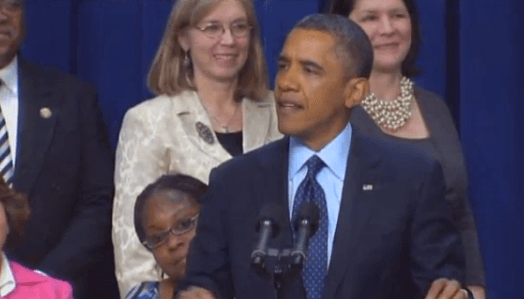Deal near, but work remains, to avert fiscal cliff crisis
President Barack Obama addresses a group of citizens gathered to hear an update on the efforts to avert the fiscal cliff. (Photo from CBC video.)
With just hours left to make a day, all signs are pointing toward a last minute deal that will avert the United States from careening over the fiscal cliff.
Though details remain few and the deal could still fall apart, in a public address, President Barack Obama said it would extend unemployment benefits, avert an income tax increase for “98 percent” of Americans and also make changes to the Alternative Minimum Tax, or AMT and would limit the increase in the estate tax and preserve education and child tax credits.
What it wouldn’t do, however, is extend the three-year-old payroll tax cut, which means virtually all Americans will see a tax increase of some sort. The payroll tax cut would rise from 4.2 percent back to 6.2 percent, increasing the taxes for a single person earning $50,000 a year by about $1,000.
Republican Sen. Mitch McConnell called the deal “very, very close,” saying there was agreement on the tax portions of a deal, but still work to do to avert the budget cuts known as the sequester. Some sort of agreement is expected that would push those cuts off until March, setting up another showdown just a couple months down the road.
“Let me be clear,” McConnell said to The New York Times, “we will continue to work on finding smarter ways to cut spending, but let’s not let that hold up protecting Americans from the tax hike that will take place in about 10 hours. We can do this. We must do this.”
The cuts, about $110 billion effective Jan. 1, will cut both domestic discretionary spending and defense spending — a prospect that makes Republicans and Democrats unhappy.
But not long after Obama spoke, Republicans were already lashing out, with Sen. John McCain, R.-Ariz., taking to the Senate floor to bash Obama for his partisanship, saying his comments would cost him votes in the House of Representatives.
Already questions are being raised about the ability of whatever bill gets agreed upon to pass the U.S. House of Representatives. Liberals and Conservatives have already lined up to bash the as-yet unfinished agreement.
What remains unclear is whether the House and Senate would both be able to approve a measure today. As of 3 p.m. there were reports that House officials would not be scheduling any more votes for Dec. 31 meaning — at least for a day — the country will go over the fiscal cliff. The practical impacts of that, however, remain unknown.
